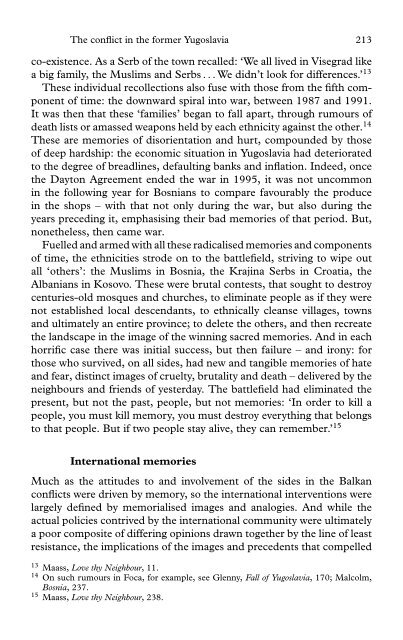Memory and Power in Post-War Europe: Studies in the Presence of ...
Memory and Power in Post-War Europe: Studies in the Presence of ...
Memory and Power in Post-War Europe: Studies in the Presence of ...
Create successful ePaper yourself
Turn your PDF publications into a flip-book with our unique Google optimized e-Paper software.
The conflict <strong>in</strong> <strong>the</strong> former Yugoslavia 213<br />
co-existence. As a Serb <strong>of</strong> <strong>the</strong> town recalled: ‘We all lived <strong>in</strong> Visegrad like<br />
a big family, <strong>the</strong> Muslims <strong>and</strong> Serbs ...We didn’t look for differences.’ 13<br />
These <strong>in</strong>dividual recollections also fuse with those from <strong>the</strong> fifth component<br />
<strong>of</strong> time: <strong>the</strong> downward spiral <strong>in</strong>to war, between 1987 <strong>and</strong> 1991.<br />
It was <strong>the</strong>n that <strong>the</strong>se ‘families’ began to fall apart, through rumours <strong>of</strong><br />
death lists or amassed weapons held by each ethnicity aga<strong>in</strong>st <strong>the</strong> o<strong>the</strong>r. 14<br />
These are memories <strong>of</strong> disorientation <strong>and</strong> hurt, compounded by those<br />
<strong>of</strong> deep hardship: <strong>the</strong> economic situation <strong>in</strong> Yugoslavia had deteriorated<br />
to <strong>the</strong> degree <strong>of</strong> breadl<strong>in</strong>es, default<strong>in</strong>g banks <strong>and</strong> <strong>in</strong>flation. Indeed, once<br />
<strong>the</strong> Dayton Agreement ended <strong>the</strong> war <strong>in</strong> 1995, it was not uncommon<br />
<strong>in</strong> <strong>the</strong> follow<strong>in</strong>g year for Bosnians to compare favourably <strong>the</strong> produce<br />
<strong>in</strong> <strong>the</strong> shops – with that not only dur<strong>in</strong>g <strong>the</strong> war, but also dur<strong>in</strong>g <strong>the</strong><br />
years preced<strong>in</strong>g it, emphasis<strong>in</strong>g <strong>the</strong>ir bad memories <strong>of</strong> that period. But,<br />
none<strong>the</strong>less, <strong>the</strong>n came war.<br />
Fuelled <strong>and</strong> armed with all <strong>the</strong>se radicalised memories <strong>and</strong> components<br />
<strong>of</strong> time, <strong>the</strong> ethnicities strode on to <strong>the</strong> battlefield, striv<strong>in</strong>g to wipe out<br />
all ‘o<strong>the</strong>rs’: <strong>the</strong> Muslims <strong>in</strong> Bosnia, <strong>the</strong> Kraj<strong>in</strong>a Serbs <strong>in</strong> Croatia, <strong>the</strong><br />
Albanians <strong>in</strong> Kosovo. These were brutal contests, that sought to destroy<br />
centuries-old mosques <strong>and</strong> churches, to elim<strong>in</strong>ate people as if <strong>the</strong>y were<br />
not established local descendants, to ethnically cleanse villages, towns<br />
<strong>and</strong> ultimately an entire prov<strong>in</strong>ce; to delete <strong>the</strong> o<strong>the</strong>rs, <strong>and</strong> <strong>the</strong>n recreate<br />
<strong>the</strong> l<strong>and</strong>scape <strong>in</strong> <strong>the</strong> image <strong>of</strong> <strong>the</strong> w<strong>in</strong>n<strong>in</strong>g sacred memories. And <strong>in</strong> each<br />
horrific case <strong>the</strong>re was <strong>in</strong>itial success, but <strong>the</strong>n failure – <strong>and</strong> irony: for<br />
those who survived, on all sides, had new <strong>and</strong> tangible memories <strong>of</strong> hate<br />
<strong>and</strong> fear, dist<strong>in</strong>ct images <strong>of</strong> cruelty, brutality <strong>and</strong> death – delivered by <strong>the</strong><br />
neighbours <strong>and</strong> friends <strong>of</strong> yesterday. The battlefield had elim<strong>in</strong>ated <strong>the</strong><br />
present, but not <strong>the</strong> past, people, but not memories: ‘In order to kill a<br />
people, you must kill memory, you must destroy everyth<strong>in</strong>g that belongs<br />
to that people. But if two people stay alive, <strong>the</strong>y can remember.’ 15<br />
International memories<br />
Much as <strong>the</strong> attitudes to <strong>and</strong> <strong>in</strong>volvement <strong>of</strong> <strong>the</strong> sides <strong>in</strong> <strong>the</strong> Balkan<br />
conflicts were driven by memory, so <strong>the</strong> <strong>in</strong>ternational <strong>in</strong>terventions were<br />
largely def<strong>in</strong>ed by memorialised images <strong>and</strong> analogies. And while <strong>the</strong><br />
actual policies contrived by <strong>the</strong> <strong>in</strong>ternational community were ultimately<br />
a poor composite <strong>of</strong> differ<strong>in</strong>g op<strong>in</strong>ions drawn toge<strong>the</strong>r by <strong>the</strong> l<strong>in</strong>e <strong>of</strong> least<br />
resistance, <strong>the</strong> implications <strong>of</strong> <strong>the</strong> images <strong>and</strong> precedents that compelled<br />
13 Maass, Love thy Neighbour, 11.<br />
14 On such rumours <strong>in</strong> Foca, for example, see Glenny, Fall <strong>of</strong> Yugoslavia, 170; Malcolm,<br />
Bosnia, 237.<br />
15 Maass, Love thy Neighbour, 238.
















